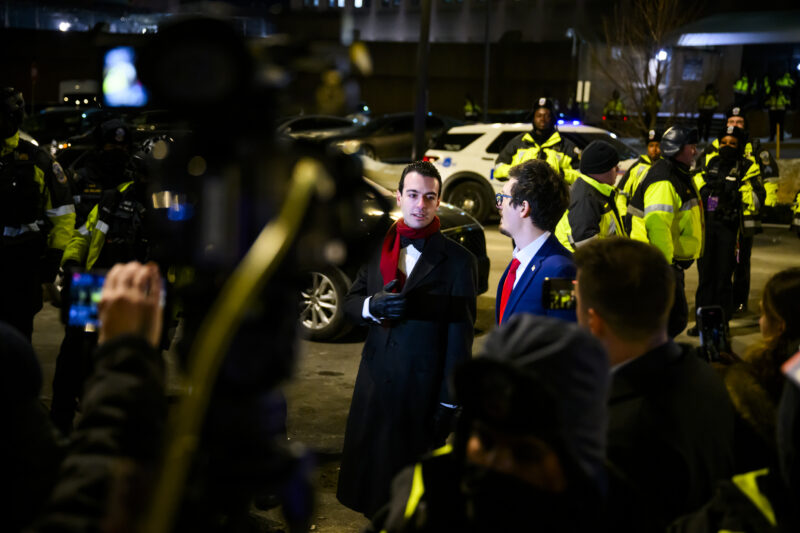Highlights from the first day of the 117th Congress
Festive swearing-in process roiled by discord over election results, COVID precautions

Bill Clark/AP
House Speaker Nancy Pelosi administers the oath of office to members of the 117th Congress.
The deep divisions that marked the 116th Congress showed no signs of abating on the first day of the 117th session on Sunday. As new members in both houses were sworn in, Capitol Hill was focused on challenges to the results of the November election and discord over congressional COVID-19 protections.
In the Senate, all four first-term GOP senators are joining a long shot effort by Sen. Ted Cruz (R-TX) to delay the counting of the Electoral College votes.
Sen. Roger Marshall (R-KS), said that he felt voters wanted representatives to continue to “follow through” on “irregularities” in the election.
“This is a decision of the heart that we need to follow through on some of these irregularities,” Marshall said Sunday in a press gaggle. “We want our day in court where everybody’s in the same room, put all the facts down and then let America decide.”
State and federal courts nationwide have repeatedly thrown out a series of lawsuits from President Donald Trump and his allies over the election results. Despite the dismissal of dozens of related court cases, Marshall insisted: “I don’t think that the courts have heard all of the facts.”
The Kansas freshman demurred when asked if he thought Senate Majority Leader Mitch McConnell (R-KY) had erred in attempting to quash the election challenges in the Senate, adding that he thinks the divisions in the conference will “make us stronger” and “prove that we can listen to each other and still come to some type of agreement that we’re professionals and we can respect each other’s opinion.”
Shortly afterward, Sen. Roy Blunt (R-MO), who opposes the election challenges, took a different tone, remarking that efforts to overturn the results are bound to fail. “I actually like to come up with plans that have a chance of being successful,” he said.
Sen. Tom Cotton (R-AR), usually a close ally of the president and a likely 2024 presidential hopeful, broke with Trump Sunday night, announcing he would also oppose the election challenge.
Incoming Democrats also faced questions about Republican moves to overturn the election results.
Sen. John Hickenlooper (D-CO), the only Senate Democrat to flip a Republican-held seat this cycle, cast an optimistic tone despite the tension in the chamber.
“Many Republicans are being torn in different directions. This is a great experiment in democracy. And this is a test and I think we’re going to get through it,” Hickenlooper said.
On the other side of the Capitol, House Speaker Nancy Pelosi (D-CA) eked out another term as speaker of the House — one she previously said would be her last — with the votes of 216 Democrats, having secured support from several representatives who opposed her in the past.
Two Democrats voted for alternative picks — Rep. Jared Golden (D-ME) cast his vote for Sen. Tammy Duckworth (D-IL), while Rep. Conor Lamb (D-PA) voted for Rep. Hakeem Jeffries (D-NY). Reps. Mikie Sherrill (D-NJ), Elissa Slotkin (D-MI) and Abigail Spanberger (D-VA) — all centrist Democrats with backgrounds in national security — voted present.
All 209 Republicans present for the vote backed House Minority Leader Kevin McCarthy (R-CA).
Res. Alexandria Ocasio-Cortez (D-NY) and Rep. Cori Bush (D-MO) — a progressive upstart who unseated a longtime Democratic congressman in Missouri’s first district — cast their votes for Pelosi late in the afternoon, after missing their assigned voting time — which had been divvied up alphabetically to limit the number of representatives on the floor and allow for social distancing.
Ocasio-Cortez’s delayed vote prompted questions about whether she had been holding out for concessions from Pelosi, something Ocasio-Cortez rejected after casting her vote. Ocasio-Cortez told The Intercept last month that she thought the House leader and other top Democrats needed to be replaced, but that there were currently no viable alternatives.
“We are just an extremely slim amount of votes away from our side risking the speakership to the Republican Party,” Ocasio-Cortez said Sunday. “This is bigger than any one of us and that is consequential… This is not just about being united as a party. It’s about being united as people with basic respect for rule of law, our Constitution and the actual underpinnings of American democracy.”
The New York congresswoman added that she believed Trump should be impeached over his call with Georgia Secretary of State Brad Raffensperger, reported by the Washington Post on Sunday, during which Trump suggested that Raffensperger “find” enough votes to reverse his defeat in Georgia.
“If it was up to me, there’ll be articles on the floor quite quickly,” Ocasio-Cortez said.
Rep. Ilhan Omar (D-MN) similarly called for Trump’s impeachment, and criminal prosecution, on Twitter on Sunday night.
Hostilities in the House began even earlier in the day, during the early afternoon quorum call to open the new session of Congress, when Rep. Marjorie Taylor Greene (R-GA) — who has promoted antisemitic conspiracy theories — and another incoming Republican legislator prompted a “screaming match” between Republican and Democratic staffers by refusing to wear masks on the House floor, in violation of House coronavirus rules.
House Republicans also objected to a new plexiglass enclosure on the House floor designed to allow House members who are nominally quarantining for COVID-19 exposure but have tested negative to vote on the floor, prompting a dispute between Rep. Rodney Davis (R-IL), the ranking member of the Committee on House Administration, and attending physician Brian Monahan.
Davis described Monahan’s explanations of the setup as “horseshit” and claimed that the “only reason this is happening is because Speaker Pelosi needs to be re-elected speaker.”
Once the speaker election wrapped up in the late afternoon, the House hit another snag when Rep. Chip Roy (R-TX) forced a recorded House vote on whether to swar in elected members from Arizona, Georgia, Michigan, Nevada, Pennsylvania and Wisconsin, which was widely viewed as an attempt to put his GOP colleagues on record as accepting all the election results in these states, despite disputing the results of the presidential race.
“It would confound reason if the presidential results of these states were to face objection while the congressional results of the same process escaped public scrutiny,” he explained on Twitter. Two Republicans, Reps. Morgan Griffith (R-VA) and Andy Harris (R-MD) voted against swearing in all new members of Congress.
Roy was one of seven House members, including Reps. Thomas Massie (R-KY), Tom McClintock (R-CA), Ken Buck (R-CO), Kelly Armstrong (R-ND), Mike Gallagher (R-WI) and Nancy Mace (R-SC) who released a joint statement Sunday afternoon denouncing their colleagues’ challenge to the election results.
The day’s events concluded when Pelosi swore in the new Congress — mostly in one large group of members who had rushed to the floor to vote on the swearing-in issue — scrapping a previous plan to swear in members in small groups.
After the first swearing-in, hundreds of representatives flooded out of the House chamber, packing nearly shoulder-to-shoulder into the hallway outside, social distancing forgotten.

































